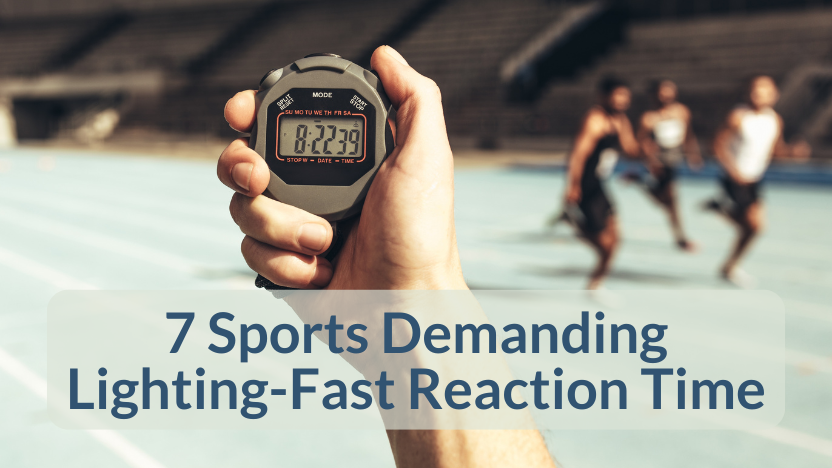7 Sports That Require Fast Reaction Times & How to Improve It
Posted by EyePromise on Sep 4th 2024
Athletes have some of the fastest reaction times, and they need it to excel at their respective sport. However, some sports require faster reaction times than others. Here are seven sports that demand athletes have quick response times to succeed.
Hockey

Whether it’s played on ice or a court, hockey is one of the fastest-paced sports out there. Not only can the pucks reach over 100 miles per hour (MPH), but the players are also on skates, increasing their speeds to more than 20MPH. With so many fast-moving parts, it’s no surprise that hockey players must have fast reaction times.
Hockey goalies have one of the toughest jobs out there. The puck is small, moves quickly, and can ricochet off anything and anyone, which makes stopping it even more difficult. Add nearly 50 pounds (lbs) of equipment, and the odds are certainly stacked against them! They rely heavily on the quickness of their visual processing speed and reaction time (and a little luck).
Soccer

Soccer is another sport that has a ton of moving parts for players to be aware of. While the parts are not as fast-moving as hockey, soccer balls can still move faster than 70MPH, which is the cruising speed of most interstates. The fastest soccer ball ever recorded went 131MPH!
Like hockey, the soccer ball can ricochet off anything or anyone intentionally or unintentionally, creating a hectic and uncertain environment for goalies. They need to be able to read and react to plays quickly to make the save. Perhaps their most difficult challenge is a penalty kick, which leaves them with just 0.3 seconds to make a decision on which direction to dive.
Tennis

Tennis is almost entirely reactionary. Athletes must anticipate every move of their opponent, trying to determine where they’ll hit the ball as well as where is most advantageous for them to return the hit. This requires extremely fast processing and reaction times, especially when serve speeds average 120MPH!
Baseball

Notoriously one of the most challenging sports in terms
f reaction time, baseball players routinely have to determine within a tenth of a second whether or not to swing the bat. When pitches are being thrown at 90MPH and up, that’s a difficult task.
Considering that there are different kinds of pitches (curve balls, sliders, fast balls, etc.), each with its own ball movement and level of difficulty, it’s nearly impossible. In fact, many believe that hitting a fast ball pitch is the hardest achievement in sports. Needless to say, athletes in this sport must have apex reaction times.
Table Tennis

Much like its “full-size” counterpart, table tennis is another sport that’s almost entirely reliant on reaction time. Also known as ping pong, table tennis requires its athletes to anticipate where the ball will go and where they want to place their next hit, as well as read the spin on the ball to best understand its trajectory. With a smaller playing field, it takes the ball 0.1 second to reach the other end of the table, leaving athletes little time to react to a serve that can reach speeds of 90MPH.
Boxing

Another sport that’s heavily reliant on good reaction times is boxing. With punches being thrown around 25MPH by elite athletes with an average of 776lbs of force, you’ll want to get out of the way. That requires the ability to anticipate hits and recognize deception, all while calculating when you should throw your next punch. All this requires processing speeds, decision making, and reaction times to be faster than your average person.
Motorsports
In a sport where motorized vehicles race at over 200MPH, reaction time is not just critical to success, but to survival. Between the course terrain, obstacles, and other racers, drivers must be able to react quickly under pressure and multitask. One wrong move, and your race, career, or life may come to an abrupt end.

How to Improve Reaction Time
Reaction time is imperative to athletes in these and other sports, but few know how to improve it. There are ways to physically train reaction time, but nutritional supplementation has been clinically demonstrated to increase reaction time by 10%. When studying college-aged baseball players, researchers found that by supplementing with at least 20 milligrams (mg) of a dietary nutrient called zeaxanthin (zee-uh-zan-thin), participants saw:
- A 20% increase in macular pigment optical density (MPOD), a protective pigment within the eye that acts as “internal sunglasses” and improves overall visual performance
- A 14% improvement in contrast sensitivity
- A 10% improvement in visual motor reaction time
Because zeaxanthin is scarce in the diet, it’s difficult to get the amounts necessary to see these kinds of results through diet alone, so supplementation is often necessary. EyePromise® is the only line of eye health performance supplements that delivers these levels of dietary zeaxanthin. Specifically, our Vizual Edge™ line of supplements are crafted with the highest quality ingredients and can help:
- Improve visual processing speed and reaction time
- Increase contrast sensitivity
- Improve visual acuity
- Reduce glare and light sensitivity
- Improve visual range
These eye health performance supplements are NSF® Certified for Sport and the best kept secret in sports.
Reaction time is a critical function for athletes of all kinds. Start improving yours with EyePromise.


